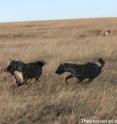Hyenas' laughter signals deciphered
Acoustic analysis of the 'giggle' sound made by spotted hyenas has revealed that the animals' laughter encodes information about age, dominance and identity. Researchers writing in the open access journal BMC Ecology recorded the calls of 26 hyenas in captivity and found that variations in the giggles' pitch and timbre may help hyenas to establish social hierarchies. Frédéric Theunissen, from the University of California at Berkeley, USA, and Nicolas Mathevon, from the Université Jean Monnet, St. Etienne, France worked with a team of researchers to study the animals in a field station at Berkeley. Theunissen said, "The hyena's laugh gives receivers cues to assess the social rank of the emitting individual. This may allow hyenas to establish feeding rights and organize their food-gathering activities."
The researchers found that while the pitch of the giggle reveals a hyena's age, variations in the frequency of notes can encode information about dominant and subordinate status. These vocalizations are mainly produced during food contests by animals that are prevented from securing access to a kill, and have been considered a gesture of submission.
Theunissen and colleagues also suggest that the giggle may be a sign of frustration and that it may be intended to summon help. He said, "Lions often eat prey previously killed by hyenas. A solitary hyena has no chance when confronted by a lion, whereas a hyena group often can 'mob' one or two lions and get their food back. Giggles could therefore allow the recruitment of allies. Cooperation and competition are everyday components of a hyena's life. When hearing a giggling individual, clan-mate hyenas could receive information about who is getting frustrated (in terms of individual identity, age, status) and decide to join the giggler, or conversely to ignore it or move away". The researchers plan to further test these hypotheses with playback experiments in the field.
Source: BioMed Central
Articles on the same topic
- Giggles give clues to hyena's social statusWed, 31 Mar 2010, 13:32:53 UTC
Other sources
- Hyena Laughter Is Serious Businessfrom Science BlogThu, 1 Apr 2010, 12:56:17 UTC
- Giggles give clues to hyena's social statusfrom Science DailyThu, 1 Apr 2010, 3:21:13 UTC
- Giggles give clues to hyena's social statusfrom Biology News NetWed, 31 Mar 2010, 22:49:12 UTC
- Giggles give clues to hyena's social statusfrom Science BlogWed, 31 Mar 2010, 14:21:30 UTC
- Hyenas' laughter signals decipheredfrom Science DailyTue, 30 Mar 2010, 3:21:10 UTC
- Hyena laughs and giggles decodedfrom BBC News: Science & NatureTue, 30 Mar 2010, 2:07:09 UTC
- Hyenas' laughter signals decipheredfrom PhysorgMon, 29 Mar 2010, 23:56:09 UTC
